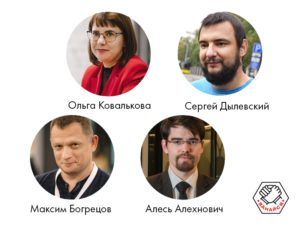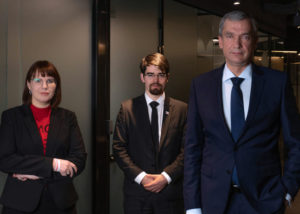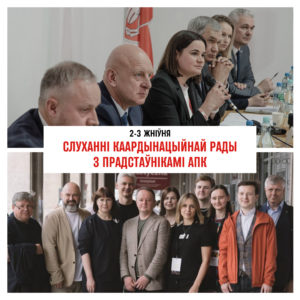In this new video, Ales Aliakhnovich, representative of the Economic Group of the Coordination Council and Sviatlana Tsikhanouskaya’s adviser on economics, speaks about economic sanctions. Long-term political repressions in Belarus can have serious economic consequences, in the neighbouring countries as well.
“Such a neighbour does not only cause trouble for the West. It will become toxic for Russia, too, which banks and companies might be affected by cooperating with the Belarusian companies while the Russian budget will be used for refinancing debts of Belarus”, Ales Aliakhnovich explains.
Good afternoon, my name is Ales Aliakhnovich. I am Sviatlana Tsikhanouskaya’s adviser on economics and a member of the Economic Group of the Coordination Council.
I would like to speak about the economic sanctions today. Some say they will bring the economy down, because the regime states they would not have any effect and is ready to impose sanctions in response. What will actually happen? Let’s figure it out.
First of all, sanctions are a long step-wise process. It has begun with non-recognition of the election results and Lukashenko’s legitimacy by the USA, Canada, the European Union, Great Britain and other democratic countries.
Then, there were personal sanctions by the same countries; they are constantly being expanded.
And on November 19, after Raman Bandarenka was killed, the EU announced the preparation of the third sanction package including targeted economic sanctions against specific companies and businessmen connected with Lukashenko. European companies and individuals will be prohibited to trade, deal and invest in the “black listed” Belarusian companies. The lists might be made public already on December 7, at the meeting of the Ministers of Foreign Affairs of the EU.
Additionally, the EU, the European Bank for Reconstruction and Development (EBRD) and the European Investment Bank (EIB) suspended new projects in the government sector. If the non-repayable financial aid from the EU in 2019 constituted about USD30 million, the EBRD’s and the EIB’s loans amounted to over USD900 million (1.5% GDP). Limitation of the World Bank’s activities in Belarus is also possible; last year, the World Bank realised projects worth USD500 million. Earlier, in September, the IMF refused to start the new programme of economic support for Belarus worth USD940 million.
All these are not just symbolic pressure or an image blow to the regime. The Belarusian economy will feel the consequences within the next few months. We should anticipate:
- Termination of new foreign investment.
- Private disinvestment in the Belarusian economy.
- Frozen access to international loans for the whole government sector including the state-owned banks and companies.
This sounds serious, but it’s only the beginning. Likely, the USA will join the economic sanctions against the regime in the near future. Then the sanctions might affect the Russian stakeholders being owners of some companies and banks in Belarus and working with the Belarusian partners.
Should the repressions continue and the targeted economic sanctions not give any result, a transfer to sectoral sanctions is possible, such as:
- embargo on importing oil and petroleum products from Belarus, potassium fertilizers and ferrous materials; or
- disconnection of Belarus from the SWIFT system.
This is not a laughing matter. This will cause serious consequences for the economy. Such a neighbour does not only cause trouble for the West. It will become toxic for Russia, too, which banks and companies might be affected by cooperating with the Belarusian companies while the Russian budget will be used for refinancing debts of Belarus.
Lukashenko’s another strategic “friend”, China, risks losing a stable partner processing almost all the continental transit of the Chinese goods to Europe and housing the Great Stone Park which was supposed to work successfully. Such a problematic partner is not welcome.
With its actions – physical torture, violence and murders – the regime is not only destroying the society, it is also destroying our economy, our future. No decent Belarusian would wish its country such consequences. We all, 9.5 million people, are hostages to Lukashenko’s criminal politics. He is the one bearing responsibility for the situation.
Yet the end awaits only Lukashenko’s regime. Democratic changes in Belarus will result in explosive growth of new private initiatives, return of capital and of the best Belarusians abroad. And the international support will only improve the Belarusian’s achievements and contribute to rapid restoration of the Belarusian economy.
Watch more videos with Ales Aliakhnovich in which he speaks about:











